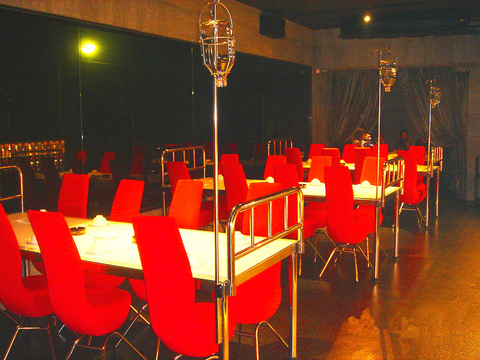When I stepped into DS Music Restaurant, I found it to be an extremely well-put-together, professional establishment with good food and a pleasant atmosphere that is night-lifey but not overwhelming. This disturbed me.
The reader is invited to consider the nurse fetish. It is an institution that lies at the heart of DS. And so I entered DS prepared to immerse myself in sleaze and then write ironically about it. What I found, though, was a disquietingly congruous marriage of unabashed hedonism and well-funded good taste.
Overall, DS looks like many other posh restaurant-and-bars, with lots of spot lighting, funny-shaped chairs, and clear alcohol bottles lit from underneath. Except that many of the tables look like sleek hospital beds, there are a few wheelchairs and crutches sitting around, backlit X-rays decorate some walls, and above each table hangs a big "IV drip," which functions like a small keg. And then, of course, there are nurses everywhere you look.

PHOTO COURTESY OF DS MUSIC RESTAURANT
The hospital theme is pervasive, but somehow subtle, or at least natural. I never thought I would say this, but it turns out that a wheelchair does not look out of place next to a wall of Smirnoff Ice bottles. There is something appealing about the audacity of taking a concept as (someone has to say it) flagrantly trashy as this and making something so cool out of it. To top it off, the food is good.
The menu consists of lightly Westernized Chinese, Japanese and Thai, with an inexplicable but not unwelcome Polynesian flare running through the presentation. The sashimi, for example, is served on a mountain of ice covered with leaves and flowers. The "Fire Pheonix Beer (sic)" (火鳳牛柳) is a successful beef-and-pineapple stir-fry served inside a hollowed-out half pineapple.
As is probably apparent in that last sentence, the English on the menu is more color commentary than viable translation. Some items -- like the pretty-good XO sauce stir-fry prawn ball (served on a bed of water convulvus) -- are more or less what they sound like, but the menu really isn't navigable without some knowledge of Chinese. Nor are the waitresses hired for their English.
It should be said that, DS, despite its thematically seamy underbelly, is family safe (the one exception is the Saturday night "showgirl" performance). The nurses outfits are not tailored to be especially kinky, and as far as I can tell the curtained-off "intensive care unit" is nothing more than a place where large groups can sit together.

As Taiwan’s second most populous city, Taichung looms large in the electoral map. Taiwanese political commentators describe it — along with neighboring Changhua County — as Taiwan’s “swing states” (搖擺州), which is a curious direct borrowing from American election terminology. In the early post-Martial Law era, Taichung was referred to as a “desert of democracy” because while the Democratic Progressive Party (DPP) was winning elections in the north and south, Taichung remained staunchly loyal to the Chinese Nationalist Party (KMT). That changed over time, but in both Changhua and Taichung, the DPP still suffers from a “one-term curse,” with the

Jan. 26 to Feb. 1 Nearly 90 years after it was last recorded, the Basay language was taught in a classroom for the first time in September last year. Over the following three months, students learned its sounds along with the customs and folktales of the Ketagalan people, who once spoke it across northern Taiwan. Although each Ketagalan settlement had its own language, Basay functioned as a common trade language. By the late 19th century, it had largely fallen out of daily use as speakers shifted to Hoklo (commonly known as Taiwanese), surviving only in fragments remembered by the elderly. In

William Liu (劉家君) moved to Kaohsiung from Nantou to live with his boyfriend Reg Hong (洪嘉佑). “In Nantou, people do not support gay rights at all and never even talk about it. Living here made me optimistic and made me realize how much I can express myself,” Liu tells the Taipei Times. Hong and his friend Cony Hsieh (謝昀希) are both active in several LGBT groups and organizations in Kaohsiung. They were among the people behind the city’s 16th Pride event in November last year, which gathered over 35,000 people. Along with others, they clearly see Kaohsiung as the nexus of LGBT rights.

In the American west, “it is said, water flows upwards towards money,” wrote Marc Reisner in one of the most compelling books on public policy ever written, Cadillac Desert. As Americans failed to overcome the West’s water scarcity with hard work and private capital, the Federal government came to the rescue. As Reisner describes: “the American West quietly became the first and most durable example of the modern welfare state.” In Taiwan, the money toward which water flows upwards is the high tech industry, particularly the chip powerhouse Taiwan Semiconductor Manufacturing Co (TSMC, 台積電). Typically articles on TSMC’s water demand